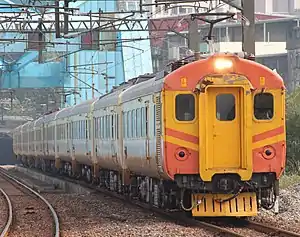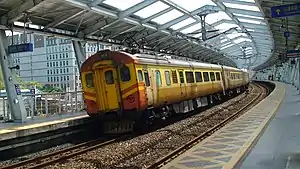EMU100 series
The Taiwan Railway EMU100 series was a set of rail cars fabricated by British Rail Engineering Limited and the General Electric Company in 1976 that has operated in Taiwan.[1] The alternating current electric multiple unit (EMU) fleet entered full squadron service in 1979, and was withdrawn from service in 2009. This class of railcars were the first to operate on the electric Tzu-Chiang Express. Due to the unit's British origin, rail buffs have variously nicknamed them "British Girl", "British Lady", or "British Grandma".[2]
| EMU100 series | |
|---|---|
 EMU100 Tze-chiang limited express at Badu station. | |
 The interior of passenger cabin. | |
| In service | 1978–2009 |
| Manufacturer | BREL York |
| Family name | BR Second Generation |
| Constructed | 1977 |
| Number built | 13 trainsets |
| Formation | 5 cars per trainset |
| Capacity | 236 seats |
| Operator(s) | Taiwan Railways Administration |
| Specifications | |
| Car length | 20.09 m (65 ft 11 in) |
| Width | 2.802 m (9 ft 2 3⁄8 in) |
| Height | 3.8 m (12 ft 5 5⁄8 in) |
| Maximum speed | 120 km/h (75 mph) |
| Power output | 1,275 kW (1,710 hp) |
| Electric system(s) | 25 kV 60 Hz Overhead |
| Track gauge | 1,067 mm (3 ft 6 in) |


Background
In the early 1970s, the West Coast Mainline Electrification Scheme was already planned. Taiwan Railways had ordered 20 electric locomotives manufactured by Union Carriage & Wagon of South Africa and also 13 sets of five-car electric multiple units (total 65 vehicles) from England's British Rail Engineering Limited (BREL) and General Electric Company (GEC). Identified as the Taiwan Railways EMU100 series, the set included driving power coach 50EP100, motor coach 55EM100, two trailers 40ET100, and driving trailer 40ED100.
BREL and GEC were awarded the design-build contract, and the sets were assembled at the former's Holgate Road carriage works in 1976; the carriages are closely based on the British Railways Mark 2 design. Throughout 1978 the sets were delivered to Taiwan for testing and acceptance.
Although full service was inaugurated on 15 August 1978, within a month the EMU100 units had been temporarily sidelined due to air conditioning trouble and various component issues. The 50-ton motor power coach (50EP100), which contained the 25 kV AC main transformer, was too heavy and caused bogie suspension stress issues, and was a safety concern when operating at high speeds. After four month of intensive troubleshooting involving TRA Mechanical section and the original equipment manufacturers, the vehicles were re-launched on 2 January 1979 in revenue passenger service. It was not until 1 July 1979, when the West Coast Mainline Electrification Project had reached substantial completion throughout its entire project length, had Tzu-Chiang been able to reach its full potential of operating at 120 km/h. Taking 4 hours and 10 minutes between Taipei and Kaohsiung, the EMU100 broke prior service speed records set by the White Steel Train DR2700 diesel multiple unit operating as the Kuang-Hwa Express, and became TRA's newest-generation premier express. [3][4][5]
After 30 years of service, the EMU100 series was withdrawn from regular commercial service in 2009. It has been used on special occasions since.[6]
References
- Huang, Powen (黃柏文). The Patriarchal EMU100 ("元老級的自強號"). In Train Collection. Retrieved from http://emu300ct.myweb.hinet.net/index/tramus/EMU100.htm on October 27, 2010.
- "流浪攝影記: 車種介紹-EMU100自強號" (in Chinese). Retrieved 2012-03-22.
- 自強號 (in Chinese). 悠遊台灣鐵道. Retrieved 2012-03-22.
- "EMU100型自強號簡介" (in Chinese). Retrieved 2012-03-22.
- "新阿霖車站:電聯車EMU100型" (in Chinese). 1999-07-21. Retrieved 2012-03-22.
- Shan, Shelley (2011-03-07). "Around-the-nation train tour resumes in Hualien". The Taipei Times. Retrieved 2013-11-17.
External links
![]() Media related to TRA EMU100 at Wikimedia Commons
Media related to TRA EMU100 at Wikimedia Commons